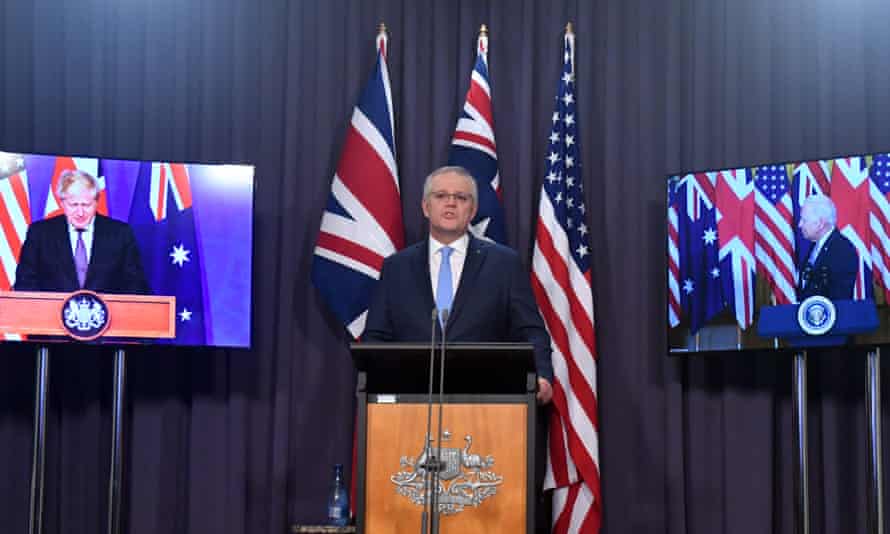Written By: Hrishik Roy
Recently, the United States, the United Kingdom and Australia have announced a new three-way strategic defence alliance between the three countries. Dubbed as the AUKUS, this alliance will seek to provide Australia with nuclear powered submarines which are much more technologically advanced than the current Australian submarine fleet and will help expand its control in the Indo-Pacific region. It is important to note here that the submarines do not have a nuclear arsenal, but are simply powered by nuclear reactors. Over the next 18 months, the three countries will examine the requirements for handling such delicate and sensitive technology and this new defence alliance will be permanent.
This essentially means that Australia will scrap off its 2016 deal of acquiring 12 diesel powered submarines from France- a move that has already caused an outcry from the French. The French foreign minister Jean-Yves Le Drian referred to the alliance as a “stab in the back” and has drawn parallels between the sneaky actions of Joe Biden and former US President Donald Trump. It seems that despite Trump leaving the office, his “America First” policies still have an effect in Washington. It will be interesting to see how the Transatlantic relationships play out at this point after this severe blow to the French, and the EU as a whole, by its American allies. This may result in a much more assertive European Foreign Policy as pointed out by EU Foreign Policy Chief Josep Borrell.
Even though none of the three leaders of the AUKUS alliance explicitly mentioned anything about China, it is fairly obvious that one of the fundamental reasons for the pact is China’s rapid militarization in the region. Beijing’s accelerating aspirations are perceived to be threatening by its Western adversaries, especially in the South China Sea. It has defied the 2016 decision by the Permanent Court of Arbitration at The Hague and has claimed most of the territories in the South China Sea despite competing claims from Brunei, Malaysia, the Philippines, Taiwan and Vietnam.
With the long-range and extremely quiet nuclear-powered submarines, Australia will be able to play a more active role in the region, along with the other members of the Quadrilateral Security Dialogue (the United States, India, and Japan). This essentially means that China is faced with a new and stronger defence and it has already denounced the AUKUS pact saying that such partnerships should not target third countries and has warned of an intensified arms race in the region. Chinese Foreign Ministry spokesman Zhao Lijian said that the three countries were “severely damaging regional peace and stability, intensifying an arms race, and damaging international nuclear non-proliferation efforts”.
The deal was welcomed by a variety of countries in the region, primarily Japan and India, as it imposes higher costs on any military planning by the Chinese. Others, such as Malaysia and Indonesia, have been skeptical of its geopolitical implications. Indonesia and Malaysia have shared deep concerns regarding the fact that an arms race might be on the horizon as a result of the regional provocations arising from the AUKUS alliance. According to Evan Laksmana of Jakarta’s Centre for Strategic and International Studies, Indonesia’s deepest fear is that the new arrangement leaves it as a “strategic spectator,” at the mercy of forces beyond its control. Therefore, if any conflict breaks out in the region, Indonesia will be caught in the midst of forces much stronger than its own thanks to its geographical position.
Even though the idea of the United States going to a cold war with China may have been initially treated with its fair share of skepticism in the past, it is now very evident that Washington is prepared to take such a momentous step against Beijing. This reinforces the idea that the primary interests of the United States in the South East Asian region is heavily leaning towards security engagement, at the detriment of more severe issues- pandemic and climate change- faced by the regional actors.
In the face of such hostility from the US, China is likely to roll out its major advantage over its American adversaries- economics. As a matter of fact, a day after AUKUS was announced, China applied to join the Comprehensive and Progressive Agreement for Trans-Pacific Partnership (CPTPP). The CCTPP, which was signed by 11 countries including Australia and New Zealand, is the successor agreement to the Trans-Pacific Partnership from which Donald Trump withdrew the US back in 2017. Therefore in absence of the United States, China joining this economic pact will ensure that the surrounding nations are pulled by the economic gravity of China and will be under its influence.
Despite China not being admitted to the CCTPP immediately, the announcement neatly underscores the continuing rift in how Washington and Beijing conceive of ‘competition’ in Asia. It will be both interesting and concerning for ASEAN countries- including Bangladesh- and other regional actors to see how things play out as Western powers start lurking in the Eastern waters.
Bibliography:
- Al Jazeera. (2021a, September 16). France accuses Biden of sinking Australia submarine deal. Military News | Al Jazeera. https://www.aljazeera.com/news/2021/9/16/france-accuses-biden-of-sinking-australia-submarine-deal
- Al Jazeera. (2021b, September 18). China’s Xi warns of ‘interference’ as Australia brushes off anger. South China Sea News | Al Jazeera. https://www.aljazeera.com/news/2021/9/18/chinas-xi-warns-of-interference-as-australia-shrugs-off-anger
- Hunnicutt, T., Bose, N., Brunnstrom, D., & Packham, C. (2021, September 17). China, France denounce U.S. nuclear sub pact with Britain, Australia. Reuters. https://www.reuters.com/world/asia-pacific/australia-get-us-nuclear-submarine-technology-china-looms-large-2021-09-15/
- SCMP Editorial. (2021, September 21). New Aukus alliance yet another threat to peace and stability. South China Morning Post. https://www.scmp.com/comment/opinion/article/3149212/new-aukus-alliance-yet-another-threat-peace-and-stability
- Shirodkar, R. (2021, September 18). Malaysia Says AUKUS Alliance May Lead to Arms Race, Provocation. Bloomberg. https://www.bloomberg.com/news/articles/2021-09-18/malaysia-says-aukus-alliance-may-lead-to-arms-race-provocation
- The Diplomat. (2021, September 20). What Does the New AUKUS Alliance Mean for Southeast Asia? https://thediplomat.com/2021/09/what-does-the-new-aukus-alliance-mean-for-southeast-asia/
- Walt, S. M. (2021, September 20). What AUKUS Really Means. Foreign Policy. https://foreignpolicy.com/2021/09/18/aukus-australia-united-states-submarines-china-really-means/
- Wintour, P. (2021, September 17). What is the Aukus alliance and what are its implications? The Guardian. https://www.theguardian.com/politics/2021/sep/16/what-is-the-aukus-alliance-and-what-are-its-implications
Featured Image Courtesy: The Guardian
